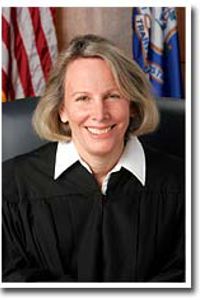Chase Rogers
Chase T. Rogers was the chief justice of the Connecticut Supreme Court. She was appointed to the court in the state's assisted appointment method of judicial selection on April 25, 2007, by Governor Mary Jodi Rell. In 2015, she was renominated by Governor Dan Malloy. Her term would have expired in 2023. She retired from the bench on February 5, 2018.[1] To learn more about this vacancy, click here.
Education
Rogers received her undergraduate degree from Stanford University in 1979. She earned her J.D. from Boston University School of Law in 1983.[2]
Career
- 2007-2018: Chief justice, Connecticut Supreme Court
- 2006-2007: Judge, Connecticut Appellate Court
- 1998-2006: Judge, Connecticut Superior Court
- 1983-1998: Attorney and partner, Cummings & Lockwood[2]
Appointments
Connecticut Supreme Court Chief Justice Chase Rogers retired on February 5, 2018. In a letter to colleagues announcing her retirement, Rogers wrote, "When I began my tenure in 2007, I told my family and close friends that I thought ten years in a position of leadership was just about right...I continue to believe that and, therefore, have decided to move on to new tasks before I overstay my welcome."[3]
Under Connecticut law, Democratic Governor Dan Malloy appointed Rogers' replacement. Malloy's nominee, Connecticut Supreme Court Justice Richard A. Robinson, was confirmed by the Connecticut General Assembly on Monday, April 30, 2018.[4] Robinson was Malloy's sixth appointment to the seven-member supreme court.
Awards and associations
Associations
- 2016 - Present: Chairperson, Board of Directors, State Justice Institute
- 2012 - Present: Member, Federal-State Jurisdiction Committee, Judicial Conference of the United States (appointed by Chief Justice of the United States John Roberts)
- 2010 - Present: Member, Board of Directors, State Justice Institute (appointed by President Barack Obama)
- Member, Board of Directors, Conference of Chief Justices[2]
Political ideology
In October 2012, political science professors Adam Bonica and Michael Woodruff of Stanford University attempted to determine the partisan ideology of state supreme court justices. They created a scoring system in which a score above 0 indicated a more conservative-leaning ideology, while scores below 0 were more liberal.
Rogers received a campaign finance score of 0.01, indicating a conservative ideological leaning. This was less conservative than the average score of 0.05 that justices received in Connecticut.
The study was based on data from campaign contributions by the judges themselves, the partisan leaning of those who contributed to the judges' campaigns, or, in the absence of elections, the ideology of the appointing body (governor or legislature). This study was not a definitive label of a justice, but an academic summary of various relevant factors.[5]
See also
External links
- Connecticut Supreme Court
- Connecticut Judicial Branch, "State of the Judiciary Address," April 13, 2011
Footnotes
- ↑ Fairfield Daily Voice, "After 10 Years On High Court, Chief Justice Chase Rogers Is Stepping Down," November 2, 2017
- ↑ 2.0 2.1 2.2 Cite error: Invalid
<ref>tag; no text was provided for refs namedcr - ↑ Hartford Courant, "Chief Justice Chase Rogers Retiring," November 2, 2017
- ↑ theday, "House unanimously confirms Robinson as chief justice," April 30, 2018
- ↑ Stanford University, "State Supreme Court Ideology and 'New Style' Judicial Campaigns," October 31, 2012
Federal courts:
Second Circuit Court of Appeals • U.S. District Court: District of Connecticut • U.S. Bankruptcy Court: District of Connecticut
State courts:
Connecticut Supreme Court • Connecticut Appellate Court • Connecticut Superior Court • Connecticut Probate Courts
State resources:
Courts in Connecticut • Connecticut judicial elections • Judicial selection in Connecticut








